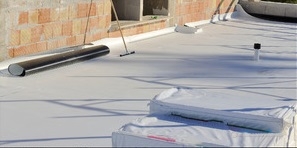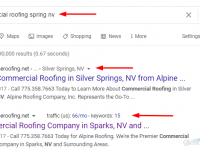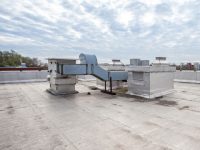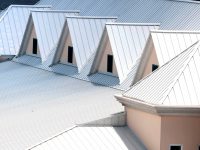Single Ply Roofing Material
If you are needing a new commercial roof, you might be thinking, “What is the best material for a flat roof?” There are many flat roof material options to choose from such as built-up roofing, modified bitumen roofing, single-ply roofing, and spray foam roofing. Built-up and modified bitumen roofing are roofs that are made of multiple layers of materials and are pretty common for commercial roofs. A lot of people might not know what a single ply roof is and ask, “What is a single-ply roof membrane?” They are roof membranes that are made up of plastic materials that give them strong and flexible qualities. While built-up and modified bitumen roofs are pretty common, single ply roofs are starting to outweigh them in terms of popularity. This has to do with the fact that single-ply roofing is strong, durable, and flexible, making them excellent commercial roofing systems. If you are interested in single ply roofing for your building, it’s best to get in contact with a commercial roofing company. They will be able to tell you about the single ply roofing how to, as well as other information that you need.
Best Single Ply Roofing
When it comes to finding the best single ply roofing system, commercial property owners have a couple of options. There are three single-ply roofs that building owners can choose from, which are EPDM, PVC, TPO.
EPDM roofing is a thermoset rubber roofing system that is made out of ethylene and propylene. One of the first questions that are asked about EPDM is, “How long does an EPDM roof last?” and the answer is up to 50 years, which is a really great advantage. Other reasons that people love EPDM roofs are because they can resist hail, wind, UV rays, severe temperatures, and thermal shock. While they are durable, they can be prone to punctures, which can let water in the roof.
PVC roofing is a thermoplastic roofing system that is made of synthetic plastic polymers and vinyl. One of the great things about this roof is that the seams heat-welded, which means they won’t separate. These single-ply roofs are also ENERGY STAR® qualified, so they can save property owners money on energy costs. Another thing to mention is that if your roof comes into contact with chemicals, PVC roofing is resistant to oil, grease, and acid. When it is colder outside, these roofs tend to shatter and can shrink over time.
TPO roofing is also a thermoplastic roof that is made up of polyolefins or plastics. They are considered a cool roof which means it will decrease your energy costs, and they are ENERGY STAR® qualified just like PVC roofs. It is also resistant to punctures and chemicals and is eco-friendly. These roofs only last up to 15 to 20 years and they can start to shrink when they are in contact with UV rays for too long.
Because TPO and PVC roofing are both thermoplastic roofs, people tend to wonder, “What is the difference between TPO and PVC roofing?” There are many differences between these two, TPO roofing is more weather-resistant, eco-friendly, and can resist fungal growth, whereas PVC roofing is more flexible and chemical resistant. When deciding what is the best single ply roofing system, it will depend on your personal preferences, as well as the budget.
Is Single Ply Roofing the Best Material for You?
Do you think that single-ply roofing might be the best roofing option for your building? Understanding the different single ply roofing materials can offer you is great, but it’s also important to know the general pro and cons of single-ply roofs. Below are the advantages and disadvantages of having a single-ply roof.
Single Ply Roof Pros
- Long-Lasting: How long does single ply roofing last? Depending on what material you choose, your single-ply roof can last 25 to 50 years.
- Lightweight: The material is incredibly lightweight, which means it won’t add any extra weight to the structure of your building.
- Energy-Efficient: Because of the material that is used, as well as the color, single ply roofs are very energy-efficient.
- Flexible: Since the material is very flexible it can work with different sizes and shape roofs.
- Resistant: The material will also depend on this, but single-ply roofs are resistant to UV rays, hail, wind, and chemicals.
Single Ply Roof Cons
- Easily Punctured: While this roof is durable and manufactured to last, it can puncture easily due to being lightweight and flexible.
- Hard to Install Around Roof Penetrations: If there are pipes, vents, or HVAC systems on your roof, it can be hard to install single ply roofing around them.
- UV Damage: This really applies to certain types of single-ply roofing, but if a single ply roof is exposed to UV rays for a long period of time, it can start to adhesive for the seams.
- Roof Seams Can Leak: Roofers take extra care to ensure the seams do not get infiltrated with water, but it can still happen on occasion.




